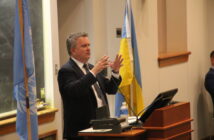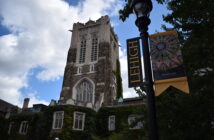Joseph Helble, ’82, will serve as Lehigh University’s 15th president following President John Simon’s departure.
Helble currently serves as the provost for Dartmouth College and will assume his role at Lehigh on August 16.
The Brown and White sat down with Helble to learn more about what his time at Lehigh was like, how he found himself assuming this position and his future plans for the univieristy.
Q: What prompted you to seek out the role of president and what was the process like?
Joseph Helble: The process for most universities and colleges that are looking for presidents is very similar to the process Lehigh undertook. There was a search committee, a search document that was written, a position description and the search committee working with the search firm reaches out to people who they think would be interesting candidates for the position and might be interested in considering the position. That’s the way it worked at Lehigh and I was contacted. Certainly as an alumnus, and I was very briefly a member of the board of trustees, I knew that President Simon shortly after I joined the board had announced that this was going to be his last year and I knew that Lehigh would be looking for a president. I had been thinking about my own potential interest in the opportunity when I was contacted by the search committee and asked if I would be interested in having a conversation with them and exploring it.
Q: What was your undergraduate experience at Lehigh like? What do you believe has changed for the better or worse?
JH: My undergraduate experience was eye opening for me. I was involved in sports, I was a gryphon, I was an engineering student and as much as I could I also took classes outside of engineering in arts and sciences. What I found when I was at Lehigh throughout my four years was a community of people who really took interest in me and in every student as an individual.
For me (Lehigh was) a big research university and environment that I was the first one in my family to experience. It really felt as if everyone had my best interest, my educational best interest in mind, so it gave me the confidence to explore areas I wouldn’t have explored. It gave me the confidence to try things that I wouldn’t have tried and what I’ve seen in Lehigh through the years is that very much remains true.
South Bethlehem has changed in ways I think make it much more integrated with the campus community in terms of Lehigh having offices in town and there being restaurants, shops and community activities that draw students in.
Lehigh has an emphasis on global programs for its students that I wish had existed when I was a student; that’s a really significant and important change. There are elements that feel really familiar to me but there’s also a lot that’s really forward looking and different compared to when I was a student.
Q: Since the Path to Prominence was Simon’s vision, what happens now? Does that stop without him? What plans do you have for the initiative?
JH: It doesn’t stop. The Path to Prominence is an investment in very specific elements of Lehigh’s future. The creation of the College of Health, the building is being built, the college is being created, but the vision for the focus and research within the college is to be developed or still developing and that needs to be supported through the Path to Prominence. Faculty need to be hired, a permanent dean needs to be hired to really enable that college to take shape and take off. That’s not something I see changing, in fact that’s something significantly worth supporting and investing in. I think this is a natural complement to the colleges that already existed at Lehigh and that’s going to remain an important part of the years ahead.
Raising money for financial aid is a hugely important part of the Path to Prominence to help support a broadly socioeconomically diverse community and to give all Lehigh students access to the full range of activities Lehigh has. That has to remain an important goal and it’s personally important to me. I was a financial aid recipient and I had to take out a lot of loans when I was a Lehigh student. If you look at the criticisms of higher education, access and affordability are areas where higher education is criticized. I would like to see us really invest in financial aid to makeLehigh accessible and affordable to every talented student who wants to come.
Q: National conversations surrounding race relations have led Lehigh to a commitment towards active antiracism. What are your plans to put tangible action behind those commitments to increase diversity and inclusion on campus?
JH: The first thing I need to do is walk the campus, talk to the community and understand the tangible steps, the concrete plans that are in place and ask about the goals that they’re meant to support. In this particular area, the area of diversity, equity and inclusivity, this is an area where colleges should be leaders and not followers. I think we have the opportunity to openly talk about what it means to be an openly diverse and supportive community, what it means to be openly a community where every person, student, faculty member and staff member can bring their whole selves to campus. How can we create an environment where if we see something that is wrong we are comfortable calling it out? If we see something that feels racist, we are comfortable saying that’s not right and here’s how we need to take steps to feel better. As a community if we feel that we see things that are exclusionary, how we take steps to say that’s not right. How can we have an environment and a community where all of that is respected, appreciated, even celebrated and a comfortable part of the community. I think that’s the challenge for Lehigh, that’s the challenge for absolutely every college campus. So what will I do specifically to support that? First I need to know more about the concrete steps Lehigh is taking through its current plan and planning to move in that direction.
Q: What will you do to facilitate open, transparent communication between students and the administration?
JH: As the Provost at Dartmouth I am responsible among other things for overseeing the decisions that the university makes related to our COVID-19 response including what our operating conditions are going to be, who is going to be on campus, how will classes be taught, vaccination policy, testing policy and access policy. About a year ago, working with one of my colleagues in communications we decided to start a weekly, and now it’s every other week, open conversations with the campus. I realized very early on, particularly in a pandemic, that an administrator sending out an email to either ask for questions from the community or to announce decisions was necessary, but not a particularly effective way to communicate. We started these series of conversations where I will walk through the decisions that we made, but also talk about the decisions we need to make, the thinking that goes into them and take questions.
Hearing from student communities here, now that my departure has been announced, students have appreciated the openness, honesty and transparency even if they didn’t like the decisions. There was an understanding of this is the issue we are working on, here are the parameters we are considering and ultimately here is the input that has gone into the decision. So that’s the approach that I take which is to try to communicate as openly as possible not only about what has been decided, but what needs to be decided, what kind of input we need and how the process is going to work.
I also know from my time at Dartmouth and I’m sure it’s no different at Lehigh is that (what) the faculty, staff, board and administration see as transparent isn’t going to be the same as what the students see and mean as transparent communication. There needs to be a shared dialogue. There are times I know students have a natural desire to be involved in the decision making. I’m committed to finding ways to have open and transparent communication. I’m hoping a lot of this is about building trust and I’m hoping we can get to that point. I’m looking forward to working with students.
Q: Factors including the pandemic and the Path to Prominence’s goal to expand the student body have brought Lehigh down significantly in the rankings. Do you have any apprehensions about taking on the role of president during a challenging time?
JH: I’d like to learn more first about what’s driving that (decline in rankings). I know the numbers, certainly I’ve seen them and the search committee was very open with me in sharing the numbers. Last year is understandable because it was a pandemic and the world turned upside down for every student applying to college and every college and university. This year we saw a similar acceptance rate, so what’s driving that? What’s the admissions strategy that we are using to reach out, identify, review and admit students? What’s different right now compared to what we were doing five years ago? How much of it is driven by the times and this pandemic moment versus decisions that we have made as a university strategically? And so I am aware of the changes in the acceptance rate over the past few years. The trend is certainly not in the direction we’d like to see it be heading.
Do I have any apprehension? No. This is a challenge and leading any institution has its challenges and I’m planning on being able to work with the staff and the leadership to understand what’s happening and move in a position direction. It won’t change overnight.
Q: What do the next five, ten years at Lehigh look like in your vision?
JH: My goals are first to help do everything we can to truly become a supportive and inclusive community for everyone who comes to our campus. I think community is such an important part of Lehigh for multiple dimensions.
Number two, I think there’s an opportunity to really help develop a crisp narrative that describes to the world at large what’s distinctive about Lehigh and what’s distinctive about the Lehigh education and the Lehigh opportunity. I see so much potential there and I’ve said this in other settings,but I fundamentally believe this to be true. Lehigh offers to every student the foundational elements of an education that this century needs, that graduates like you and your peers and colleagues need regardless of your major. I would like to see us break down barriers between disciplines, break down barriers between schools and have that interdisciplinary, outward looking, collaborative education. I think lehigh is in this place where it’s a midsized, student focused, globally outward looking research university. There’s something really special about that, that I think is right for this moment. I would like Lehigh to be seen and be one of the most competitive universities in this space. If we can do that over five to ten years then that’s going to help address some of the challenges you’ve raised about the trajectory.
As an alumnus this is such a special opportunity for me. This is such a deeply meaningful institution for me and to have the chance to work with the community to move Lehigh in that direction is really exciting and I think that potential is huge for the university.






Comment policy
Comments posted to The Brown and White website are reviewed by a moderator before being approved. Incendiary speech or harassing language, including comments targeted at individuals, may be deemed unacceptable and not published. Spam and other soliciting will also be declined.
The Brown and White also reserves the right to not publish entirely anonymous comments.